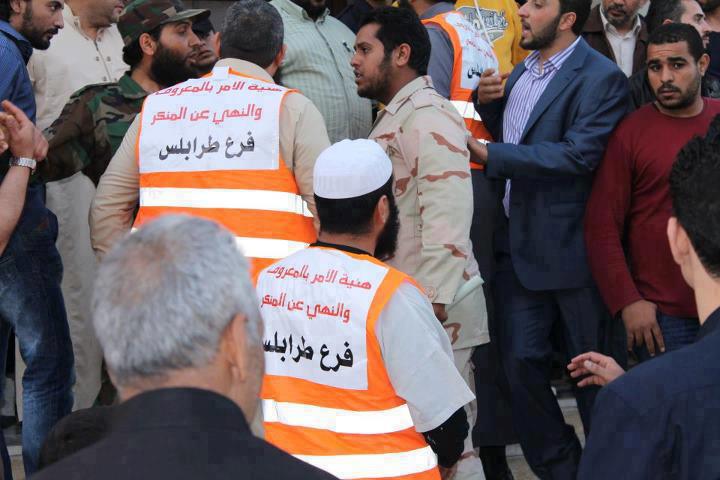By Marcus Rhinelander.
Ghadames, April 7.
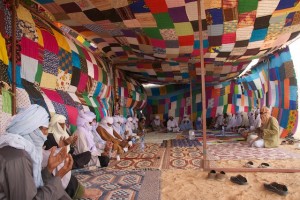
Dozens of Tuareg elders came together last Monday for an asihar, or gathering, half way between the . . .[restrict]desert border town of Ghadames and the oasis of Dirj, where many have lived since fleeing their homes in Ghadames in September. This unlikely spot, a barren plain between low, rocky hills, is their choice for the site of a new city, to be called Alwaal. Lacking virtually everything else, it has the one resource they need: water. An artesian well flows nearby, soaking into the sand. “This place is ready for the city. The water is here, the materials are ready. All we need is permission from the authorities,” said Mohammad Ibrahim Jeblani, a Tuareg elder
Seven months after the Revolution reached Ghadames, tensions still simmer between its Arab and Tuareg inhabitants. Clashes in September, 2011, left 15 dead: eight Tuareg and seven Arab. In the aftermath, 23 Tuareg houses were burned and scores of Tuareg animals killed. Thousands of Tuareg fled to Dirj or crossed into Algeria. Most have refused to return, fearing for their safety. They claim their fears are well-founded. Early Friday morning, a Tuareg car was lit on fire by unknown assailants. Four days before, two Tuareg houses were shot at with automatic weapons.
These are only the latest in a long line of intimidation and violence said to be faced by the Tuareg in the town. Five separate agreements between the Tuareg and the Arab residents of Ghadames have failed to prevent the violence. In response, Tuareg elders have renewed their call for a new town to be built in the desert to help separate the two groups. The city, to be named Alwaal, has been a dream of the Tuareg for f42 years. They say King Idris agreed to the idea in 1969, less than a month before Qaddafi came to power and rejected their request. Now, the Tuareg say, the time has come to build Alwaal. “Only then can there be peace.”
Sitting on carpets in a large, colourful, hand-quilted tent, speaking between readings from the Quran, Mohammad Jeblani talked about the gathering. “Here, we all agreed to this being a city for all the Tuareg. This whole area is Tuareg. The history, the names of all these places are Tuareg. My grandfather lived here and his grandfather too. This place is for all the Tuareg to avoid the problems in Ghadames.”
Jeblani claimed that Qaddafi’s reason for refusing the Tuareg their own city was to sow conflict between them and Arabs. Ghadames “was one city for the Tuareg and the Arabs together”. He said that the dictator wanted conflict because, that way, “we had problems with each other and not with Qaddafi!” Now, he said, “we have Tuareg teachers, we want to teach the Tuareg language in schools. We have doctors and nurses and engineers, all Tuareg . . . 400 families have decided to come to this place.”
According to Mamdo Abubakr Mohammad, a former guide for Occidental petroleum, “this is a good place for a city. A strategic place. Close to the main road between Sabha and Dirge, near water and electricity.” Even the barren location is an advantage to the former nomads. “When we lived in Ghadames, it was difficult to care about the desert. Here is better.”
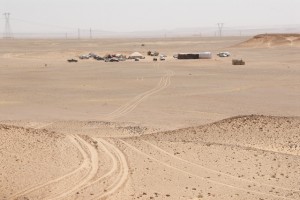
There is some dissent among the Tuareg, especially in the younger generation. The following day, Bilal Aghali, a Tuareg desert guide who left Ghadames and is now teaching English in Dirj, said that many young people don’t like the proposed site of Alwaal, and that many of “the people who left Ghadames don’t like those who stayed.” But he too agreed that a new city was needed. “We can only save our culture if we make our city a Tuareg city only for Tuareg people, where we can speak our language all day, every day.”
It has been a long time coming. “We signed an agreement with King Idris on 21 August, 1969, just before the [Qaddafi] revolution,” said Mohammad Jeblani. “We requested this city and King Idris agreed. Qaddafi’s revolution was on 1 September, ten days later. For ten days, we had this city! Since that time, nothing!” Jeblani said that four times, the Tuareg made specific requests to Qaddafi to build a new town at Alwaal, and each time they were denied.
Asked about Tuareg support for Qaddafi, he said “when the revolution came to Ghadames, all the media channels were saying that we were the problem — but this is not true! They said that all Tuareg supported Qaddafi. Not true. They said Qaddafi was hiding in the south. Not true. They found him in Sirte!”
Mamdo Abubakr Mohammad put it this way: “Before, some people were for Qaddafi. But now is a new time, with new people. Good people. The future will be one Libya working together. They say Qaddafi supported the Tuareg but you see the opposite: no new city for Tuareg, no hospital for Tuareg, no schools for Tuareg. How did Qaddafi support the Tuareg? What did he do for us?”
The litany of complaints against the rule of Muammar Qaddafi was as long as anywhere in Libya. Asked about the Great Man-Made River, which draws much of its water from land traditionally used by the Tuareg, Jeblani said: “The Tuareg people asked for one water well and they refused. Now there are 160 wells in the Great Man-Made River. We asked for just one well and they refused! The well you see here now is only two years old. We had to wait a long time for even this.”
Still, it is widely held in Ghadames and elsewhere that the Tuareg are culpable for the support that many gave Qaddafi both before and during the February 17 revolution. Khiri Othman, the supervisor of the luxury Der Ghadames Hotel, works for the Libya Touring Club, which has taken over the Der Ghadames since its Italian owners left during the revolution, apparently for good. Not a native of Ghadames, Othman has lived there for over a decade and is respected by people on both sides of the conflict. “I was sorry about the fighting in town,” he said. “People first thought that Qaddafi’s troops were coming back. Then they said that the Tuareg were coming to Ghadames, that they wanted to take over the town. We didn’t know why or for who. They are the people who started the fighting. The people here were very afraid.”
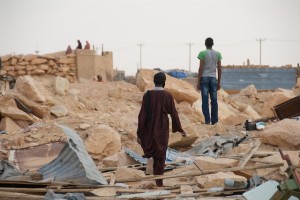
Asked about their exodus from the town, he said “the Tuareg, when they left here on August 23, they went by themselves. No one told them to go. They heard on TV that the Revolution would kill them. Qaddafi’s TV. The Tuareg people were very afraid, all ran to Algeria with their women and children. I don’t know why they don’t want to come back. They should come back. Ghadames people will forget about it. It’s the new Libya. The people here are looking for peace and quiet and tourism. They want the Tuareg to come back.”
Bilal Aghali, the former tourist guide now living in Dirj, had a similar account of the exodus. “The Tuareg families got news that NATO was coming to kill them. NATO never came here, no bombing, only drones every night. But the people were afraid.” Alhali had a very different take on the prospect of reconciliation. “Ghadames people, they don’t want anybody to live with them: Tuareg, other Arabs, anybody… Us live with them again? No way.”
Over a late-night dinner in a rented apartment in Dirj, Mani Showi Al-Lala, a Tuareg elder who also fled Ghadames, was equally adamant that it wouldn’t happen. “To go back to Ghadames is not difficult – it’s impossible!”
If the new city at Alwaal was ready, would he move? “Immediately!”
Al-Lala had only praise for the reception the Tuareg got in Dirj: “They are very hospitable people. They received us, gave us houses. I have no bad words for Dirj.” But he wanted his own home, with his own people, and away from the conflict in Ghadames.
Khalifa Sassi, a shopkeeper in Dirj, had a similar assessment. “The Tuareg are very good people, but they have many problems in Ghadames. Here there are no problems, but they should go back to their homes. They left many things behind. Here they have very little. The situation is very bad for them.. Yes, I am an Arab, but I have no problems with them. Before, maybe there were some Tuareg who caused problems. But now, no.”
Among the Tuareg, however, the distrust still runs deep. According to many of those interviewed, atrocities were committed against Tuareg wounded in the fighting. Mohammad Jeblani said “wounded men were killed in the hospital. The fingers of dead Tuareg were cut off. Why cut off fingers? The dead were not put in the refrigerators, just in normal rooms. Why? One was put in the rubbish. Why? One man in the hospital lived and has evidence of all this. Three people from Ghadames did it; we have their names, we are waiting for justice. We have a long patience.”
The hospital in Ghadames, target of much of the distrust in the Tuareg community, may have been at the centre of the latest provocation to hit the town. Aida Zlolo is a mother and English tutor for Tuareg children in Ghadames. She lives with her extended family in a house on the south, Tuareg side of town. A burned and blackened Hyundai Avante sat out front. “We have many problems in this city between the Ghadames and the Tuareg. For long time.. At the time of the fighting we went to Algeria and spent three months — came back in January. Since then there have been many problems. Peoples’ houses are shot with guns in the night. At school, Ghadames children tell Tuareg children to leave, say ‘you don’t learn here.’ After school white children attack Tuareg children, beating, sometimes with knives. Police always comes at the end, to write. But they do nothing. We have many problems, but we are still here. I don’t go anywhere.”
The car belonged to a cousin. “His aunt was sick in the hospital. People there don’t give her good care because she is Tuareg. He went to visit her in the hospital and had a problem with hospital security, Ghadames people. I don’t know exactly, but I think the hospital security sent people here to burn his car. We were sleeping here when we heard an explosion, came out and saw the car burning. All the people were afraid. The children were very afraid. We hoped the problems were finished, we came to live here again. Since then, always more problems.” But she added again, defiantly, “we will stay in Ghadames. This is our home! Even if they build Alwaal, we will stay in Ghadames.”
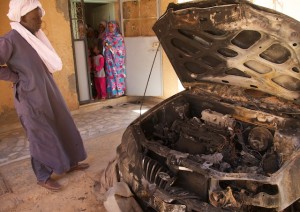
Her resolve was remarkable — and unusual. Every other Tuareg interviewed for this story was impatient to move to Alwaal, the “new city” with its promise of safety and cultural survival. “It will take a long time for things to be better: five years, ten years!” warned elder Ahmed Barka. But Mohammad Jeblani said “we have lots of patience. We will wait until this new city is ready, then we will move.”
In Ghadames, Khiri Othman hopes for peace and reconciliation. “For me, it’s better if they stay together. A hundred years here, they stayed together. We will have bigger problems in the future if they don’t stay together. With time, people will forget.” In Dirj, Mani Al-Lala, focused on a new, separate, future. “We are not thinking about Ghadames now. Ghadames is a part of our past.” At the asihar at Alwaal, Mamdo Abubakr Mohammad, was less forgiving. “We will wait,” he said, “but we won’t forget.”
Tweet
[/restrict]








